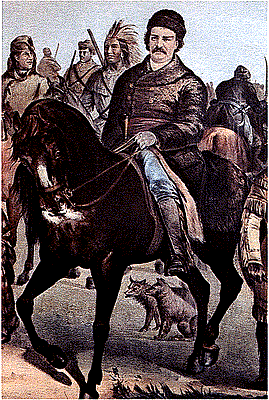
The Manitoba Rebellion 1870
In 1869, the Northwest Territories was to be transferred from the Hudson's Bay Company to the Canadian government. The Métis, who resided along the Red River, were never consulted about the terms and date of the transfer. Fearful for their language, culture, religion and the possible loss of land, Riel and his followers set up a provisional (temporary) government. A Bill of Rights embodying the people's demands was also drafted.
The Canadian government sent its negotiators and on May 12, 1870 the federal government passed the Manitoba Act creating the province of Manitoba. French and English were to be the official languages in Manitoba's legislature and Catholic and Protestant schools were to be maintained.